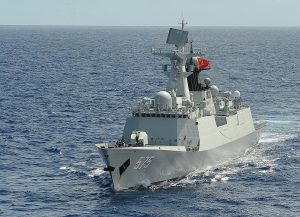Cambodia’s leader declared Monday that China has not been given exclusive rights to use a naval base on the country’s southern coast, and said that warships from all nations, including the United States, are welcome to dock there.
Prime Minister Hun Sen was responding to persistent news reports and concern expressed by Washington that Beijing had been granted basing privileges at Cambodia’s Ream naval base on the Gulf of Thailand.
Speaking at a road construction ceremony in the coastal city of Sihanoukville, Hun Sen said he recently received a message from foreign envoys in Cambodia about the issue.
He repeated denials he issued last year after The Wall Street Journal reported that an early draft of a reputed agreement seen by U.S. officials would allow China use of the Ream naval base for 30 years, where it would be able to post military personnel, store weapons, and berth warships.
Hun Sen pointed out that Cambodia’s Constitution does not allow foreign military bases to be established on its soil, but visiting ships are welcome.
“If one country’s warship is allowed to dock at our navy base, the other countries’ warships will be able to dock, too. We are not going to close it to anyone,” he said.
Hun Sen questioned what benefit Beijing would get from having a base in Cambodia while it already has bases in the South China Sea, to the east. China’s bases were established in waters that are also claimed by other Southeast Asian countries.
Many analysts believe basing rights in Cambodia would extend Beijing’s strategic military profile considerably, and tilt the regional balance of power in a manner that would pressure adjacent countries in the Association of Southeast Asian Nations whose security concerns traditionally have been aligned more closely with the United States.
Hun Sen also said Cambodia was open to holding joint military exercises with all foreign countries, but they would have to be conducted after the threat from the coronavirus has passed. Cambodia has been only mildly affected by the virus, according to official figures.
In 2017, Cambodia informed the United States that it was canceling an annual joint military exercise that year and the next. It has not been resumed. Cambodia hosted a joint military exercise with China in March as the coronavirus crisis was growing.
China is Cambodia’s biggest investor and closest political partner. Chinese support allows Cambodia to ignore Western concerns about its poor record in human and political rights, and in turn Phnom Penh generally supports Beijing’s geopolitical positions in international forums on issues such as China’s territorial claims in the South China Sea.
By Sopheng Cheang for The Associated Press.
































